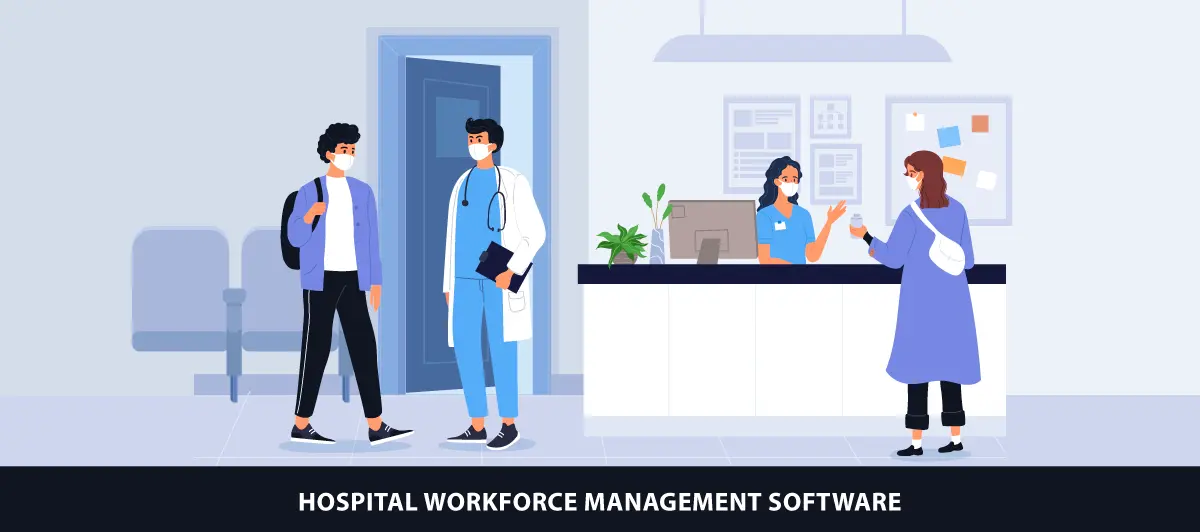Hospital Workforce Management Software: Key Benefits and Features
Quick Summary: Implementing Hospital Workforce Management Software brings numerous benefits. These benefits include efficient staff scheduling, improved patient care, reduced labor costs, and compliance with regulations. These solutions optimize staffing levels and provide real-time insights, enabling hospitals to enhance productivity and deliver high-quality healthcare services.
Introduction
Imagine two healthcare organizations have the same amount of resources. But one is flourishing with great patient experience and revenue; on the other hand, the next one even struggles to manage basic tasks. So what could be the reason? Most likely, it’s Management.
Every healthcare facility has its unique needs, and its worth can be seen in the healthcare workers, that is, doctors, nurses, and administrators. The efficiency of your healthcare practice will be measured by the strategies you use for workforce management. It is an aspect that is responsible for scheduling and staffing for better organizational flow.
With help, administration and Management in healthcare can be a challenging task and yet provide no results. Therefore people look online for hospital case management software to overcome these challenges.
Practicing in the healthcare field with poor Management can be a retarding task that can hamper clinical outcomes yet incur financial losses. Hence, it is why the adoption of hospital management software services will be on the rise.
From satisfying workforce management needs to keeping an eye on back-end business administration, software can do it all while delivering high ROI.
This article will explore the benefits of hospital workforce management software for healthcare providers and organizations.
What is Hospital Workforce Management Software?
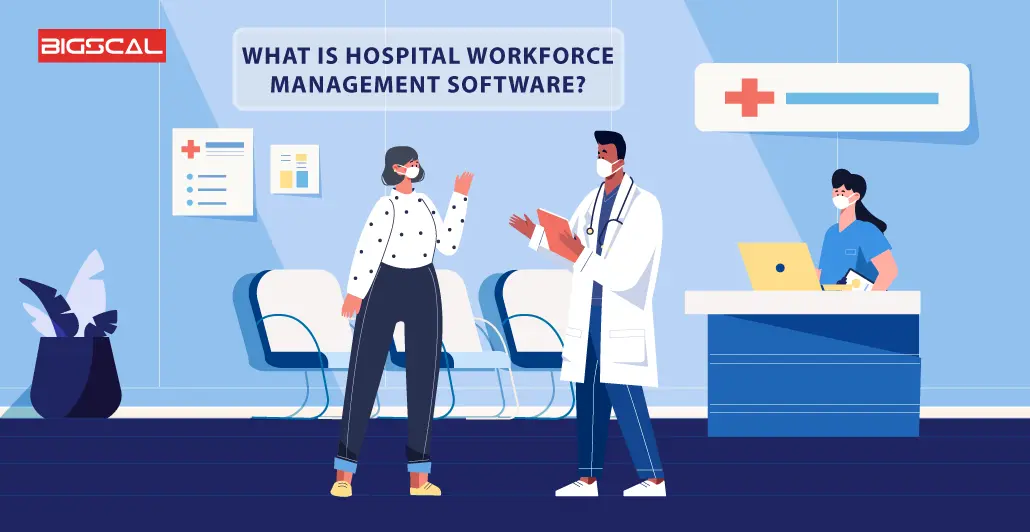
It is essential to manage a group of employees to ensure that the functioning of the organization is smooth and efficient. Hence, if you manage to do so, it will fuel the growth of your healthcare organization and improve the quality of patient care.
For the healthcare industry, the specific service that they offer is care to the patients. Any error in providing treatment or medication could lead to a worsening of the patient’s health. These errors are said to occur majorly due to overworked medical billing staff at hospitals. Hence, these issues can be a loss to the industry in terms of both liability and reimbursements.
Unlike other industries, the staff members in the healthcare industry cannot enjoy the luxury of leisure of 9 to 5 work timings schedule. There are plenty of medical emergencies like accidents, labor, heart attacks, and many other cases that make it necessary for doctors and nurses to stay back and treat patients.
Moreover, many times, a surgeon who has performed extensive surgery might not be able to attend the hospital early the next day. Not only doctors, nurses, or experts, but there are many other people employed, such as a person for verifying insurance, radiologists, claims, and pathologists who need to work in times of emergency.
Hence, handling all of these circumstances at a huge hospital with various departments is difficult when you prefer to manage with conventional pen and paper. People look online for hospital case management software as an alternative. It is crucial to have a digital solution to manage the workforce.
Hospital workforce management software will provide an interface with functions like monitoring shifts of employees, attendance management, ongoing treatment cases, outcomes of these cases, and much more.
What are the key features to look for in healthcare workforce management solutions?
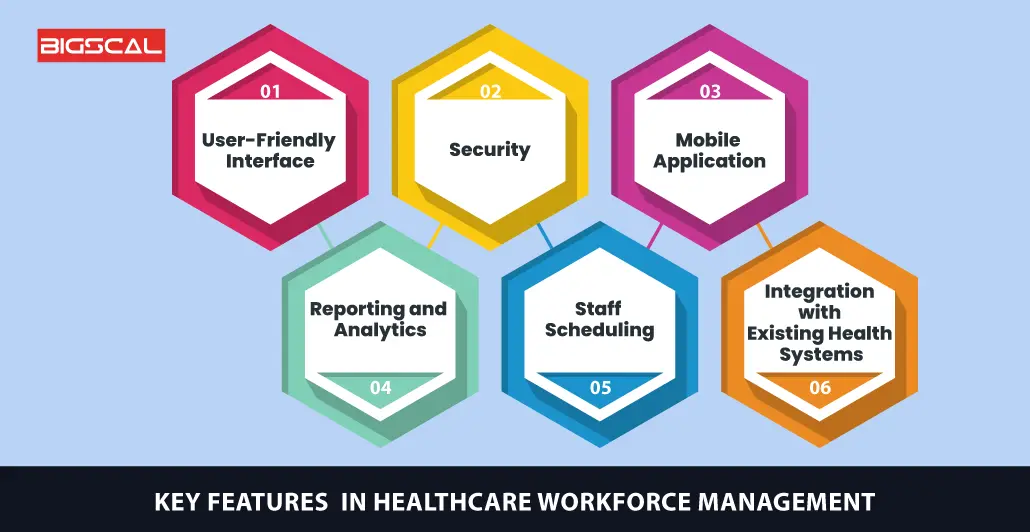
User-Friendly Interface
One of the most crucial factors to take care of when you want to purchase any software is the user-friendly interface. Hospital workforce management software that you get must be easy to use as it can impact overall business productivity. Managing human resources effectively is the main factor in ensuring a smooth workflow in healthcare organizations.
An interface that is easy to navigate makes it simple to use. One of the main indicators of a simple user interface is the count of clicks one needs to search for something or navigate from function to function. Moreover, it also depends on features like automatic notification, taskbar, and loading time that make software useful.
Security
Security is a must-have for any software, be it for healthcare ones. Software tends to hold confidential information regarding people and even their financial data.
Hence, cybercrime has steadily increased across the world, and criminals are getting bolder about their acts. Due to this, it is crucial to ensure that security is more important than ever before.
Hospitals are bound to have broadly integrated systems composed of multiple software solutions with seamless electronic data exchange processes. If one of the systems experiences a data breach, it might also compromise others.
Government regulations mandate a certain degree of security for such applications, especially in the healthcare industry. Furthermore, hospitals must use solutions that comply with laws or face steep penalties.
Mobile Application
No matter what the size of the hospital, it could be an added advantage if your hospital workforce management software is also mobile-friendly. These days, almost everyone is bound to use a smartphone, and such kinds of software that run on mobile devices can be beneficial.
Many times, administrators have to move out of the office. Hence, this type of mobile-friendly software could be a great help. It could help clinical outcomes as managers can check messages, go through files, view data, and complete tasks on the go. Moreover, it can boost workflow and overall productivity.
Reporting and Analytics
Managers should be aware of what their workforce is doing, which can help them measure the performance of their employees. One of the best ways to ensure this is through reporting.
A software that can create a detailed report on metrics like attendance, leave requests, feedback, outcomes of clinical decisions, and much more. It is a vital tool for managers to keep a check on their workforce and make decisions based on information.
Moreover, certain analytics and informatics features can process a wide amount of information and reveal data that could be more obvious to people.
You can easily identify discerns like best-paying insurance, best-rated doctor, and much more. It could be an aid to the managers in assessing their workforce better and implementing the strategies wherever needed.
Staff Scheduling
One of the most necessary features that the majority of healthcare organizations and outpatient service providers need is staff scheduling. No matter the size of the organization, it is essential to schedule their staff and consider different schedules for things like emergencies, overtime, and other situations.
Scheduling software is necessary based on the type of staffing in the organization. Many large healthcare organizations already have it and only need it sparingly.
It is a crucial feature when the organization has a vast number of employees. There is hospital workforce management software that has a function of automatic scheduling.
No matter if it’s manual or automatic, it is necessary for doctors, nurses, and others to set a good schedule. On this software, it is easy to view timing, shifts, and requirements for easy scheduling.
Integration with Existing Health Systems
Any hospital workforce management software must have the ability to integrate with third-party medical software. Hence, if you are a medical organization planning to get the software, make sure it seamlessly works with existing ones.
It should integrate with medical coding, billing software, and patient engagement. Moreover, it would lead to better patient experience and overall productivity.
What are the benefits of healthcare workforce management?
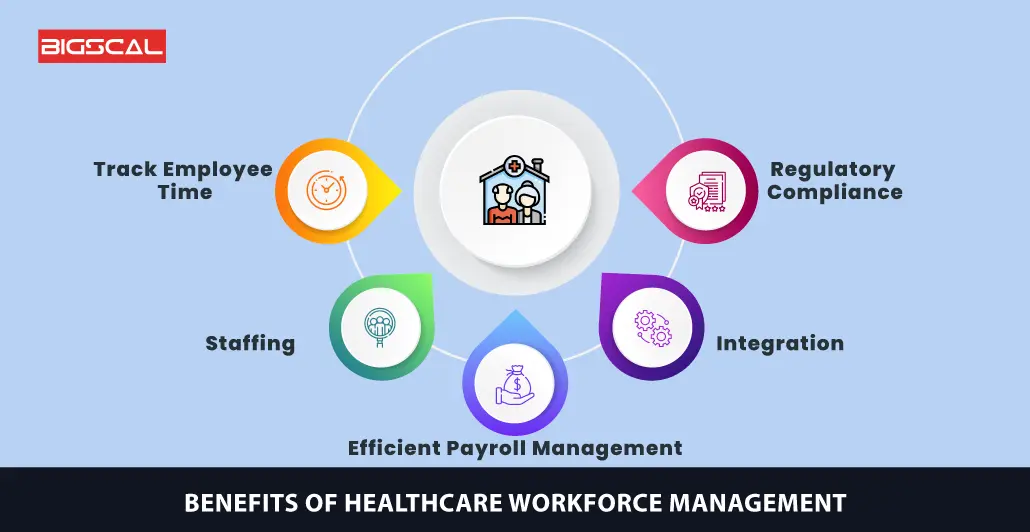
Track Employee Time
One of the major advantages of getting a hospital workforce management solution is tracking the time of employees. It isn’t a surprising thing that hospitals have to deal with lots of emergency patients and surgeries daily.
Hence, the employees have to work more than just their 9 to 5 working hours schedule. A surgeon who is treating a person with a severe head injury needs to be in the operation theater till the patient and situation is out of danger. In this case, other staff will also be pulled to stay back.
Therefore, it is crucial to take note of the entry and exit times of each employee for all days. The above-mentioned is only one example of a situation where hospital staff need to work after scheduled hours.
Having a workforce management system will lessen healthcare administrative burden by tracking employees over different hours, shifts and departments. Healthcare scheduling software can provide reports of employee timings for a month and even a year.
Moreover, healthcare scheduling software could also be beneficial in tracking the time when employees are on or off. Employees in healthcare are prone to exhaustion and burnout. There are plenty of reasons that compel them to feel worn out.
Hence, they must take a few hours or holidays to recharge. It is not only necessary for their mental health but also will ensure patient safety and operational efficiency.
Staffing
A challenge that the majority of medical organizations face is having optimum staffing. Workload remains to be an unpredictable factor when it comes to staffing in hospitals.
A senior would need to be made aware of when he will need additional support staff or when each employee has to work double shifts. Certain incidents like pandemics, explosions, or natural calamities can lead to a sudden increase in patients.
Hence, the requirement for the nursing staff can both increase and decrease at times. Therefore, having a hospital staff management system can help healthcare leaders figure out fluctuations in the needs of the workforce accurately. Hence, it will help you avoid overstaffing or understaffing. Both of these are harmful to revenue and workload and can affect patient experience.
Hospital staffing software will provide an interface that will help seniors deploy the available human resources in the best manner to ensure that there is enough staff. Hence, this will distribute workload while avoiding overstaffing.
Efficient Payroll Management
As mentioned above, there are no fixed working hours for people in hospitals, and many workers have to take an extra shift for some reason. Hence, they will have to do overtime due to a sudden demand. Therefore, manual pen and paper cannot be effective in calculating labor costs as it is very likely to cause major errors for a huge healthcare facility.
Thanks to advancements in technology in the healthcare industry, one can calculate labor costs with automation using hospital management software.
It can help track the overall productivity of an employee, such as their working hours and leave requests, and then calculate labor costs accordingly. It is not a free-of-error method but also avoids the cost of employing a separate person for accounting.
Regulatory Compliance
If you talk about healthcare, the majority of people are aware of the HIPAA regulations that all the solutions have to follow. Hence, just like other industries, healthcare organizations have laws that need to be obeyed to improve patient care. It includes everything from adequate leave requests to maternity leaves, minimum wages, and much more.
Hence, as mentioned above, hospital workforce management software ensures that hospitals can track and monitor their staff members and manage payroll efficiently.
All working reports of employees can be summed up using that software to ensure compliance. Hence, a customized platform for healthcare workforce management can be programmed in a way to ensure compliance during staff scheduling.
Integration
As mentioned earlier, a hospital is also a workplace, just like another company. Hence, it is advisable to manage staff efficiently at the hospital. Managing human resources is one of the major aspects of daily operations, along with other processes like handling medical coding, making bills, filing claims, and overall financial Management.
Having a platform for healthcare workforce management can integrate with other solutions like electronic health records to help chief nursing officers track activities.
Not just hospitals but also healthcare providers having small to medium-sized clinics can seek help from these customized management solutions for increased efficiency.
Constant innovation in cloud computing technology has led to cloud-based software that manages staff. Hence, this led to the elimination of any physical infrastructure, hardware, or IT team.
Why should companies invest in hospital workforce management solutions?
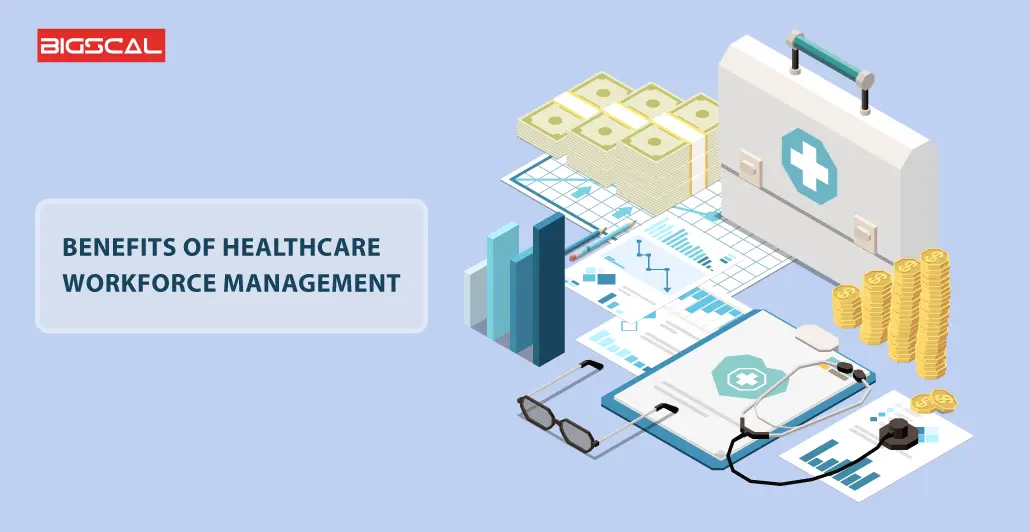
Countries like the US face a shortage of skilled healthcare providers such as physicians and nurses. The Association of American Medical Colleges also says that by the end of this decade, the country might have a shortage of hundreds and thousands of professionals.
There is an increasing amount of vacancies for nursing staff in the country. Different studies have been carried out across various healthcare systems that indicate its worsening with each year.
Not just the clinical staff but in the healthcare sector, certain non-clinical professionals are working. This staff ranges from medical coders to insurance claimers and other financial experts.
About 40% of people in the country suffer from one kind of chronic disease, and the same amount of people also suffer from anxiety and depression. To add to this situation, the COVID-19 pandemic played its part. It led to a shortage of professionals and increasing labor costs in healthcare systems.
Hence, this has led to the popularity of technologies like telehealth. However, some patients don’t find virtual care as helpful as in-person care. Therefore, one can assume from the text above that the healthcare industry is facing a high rise in cost and a shortage of professionals.
A study reveals that the labor charge has increased by about 60%, and it’s problematic. Therefore, efficient staffing is becoming one of the primary concerns of the industry.
This is why choosing the right hospital management software development for administrative burden can help streamline the processes of staffing. It can help them enhance the recruiting process, scheduling, and retention strategies by collecting all necessary data and functions. It could further increase the optimum usage of human resources and reduce employee turnover.
Need help in hospital workforce management software development? Know how Bigscal can help
When it comes to hospital workforce management software development, Bigscal is your trusted partner. Our expertise in healthcare technology allows us to craft tailored solutions that optimize staffing, streamline schedules, and enhance productivity in healthcare institutions.
We understand the unique challenges hospitals face in managing their workforce efficiently.
With Bigscal’s software, you can ensure the right staff is available at the right time, Hence it improves patient care and reduce labor costs. Our solutions also provide real-time insights, helping hospitals make data-driven decisions.
Partner with Bigscal for hospital workforce management software and a robust hospital visitor management software. Our solution empowers your institution to deliver high-quality healthcare efficiently and effectively.
Conclusion
There will be continuous advancements in the world of technology, to meet the increasing healthcare demands in the healthcare sector. With the aid and support of hospital workforce management system software, hospitals can provide the best and most accurate treatment that a patient needs. The workforce management system in healthcare helps medical organizations for optimal use of resources and save revenue.
At Bigscal, We commit to providing the best workforce management system that can deliver the best use of resources. Our solution will help you establish operational pay, manage payroll, better time management, manage schedules and leave requests, and much more in one place. Hence, if you need to make the most of the business and boost efficiency at a lower price, we can be your one-stop solution for your all workforce management needs and payroll needs.
FAQ
What is workforce management in healthcare?
The health care workforce requires strategic planning, organization, and professionalism to ensure effective and efficient delivery of health care.
What is the role of workforce management?
The role of personnel management is to allocate the right personnel with the right skills at the right time, to improve productivity, reduce costs and maintain compliance.
How Workforce Management Affects Clinical Outcomes?
Staff management ensures adequate staffing, reduces wait times for patients, improves the quality of care, and positively impacts clinical outcomes.
Is workforce management considered HR?
Together, management and human resources are specific functions. Personnel management focuses on improving employee productivity, while HR encompasses a wide range of employee-related functions.
What software do hospitals use for workforce management?
Hospitals often use specialized staff management services and software solutions based on healthcare needs. Common choices include API Healthcare, Kronos, and Infor Workforce Management. These forums help providers plan staffing, manage attendance, and optimize health care provider services.
